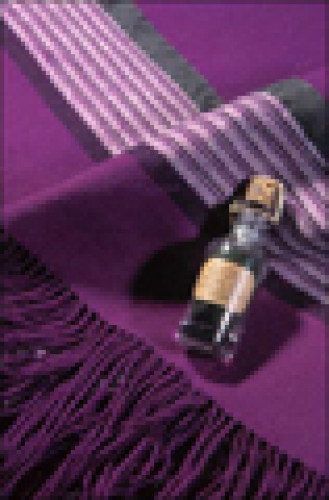
I’ve become really interested in explaining science to the public over the past few years, so when I was offered the opportunity to recreate Perkin’s synthesis of mauveine and be the chemistry expert on-set for a
BBC science series, I jumped at the chance. Filming was scheduled to take place in the week of my viva, so racked with guilty thoughts about revision, I sidled back into the lab to produce the famous purple dye. The synthesis of mauveine itself isn’t too tricky, but is pretty time consuming and low-yielding. So it was with all fingers and toes crossed that I watched the potassium dichromate turn the straw-coloured mixture of anilines into a deep black sludge. Two soxhlet extractions followed (not seen since those hazy undergraduate days...), the first to remove the tar-like impurities, leaving straw-coloured needles. Nothing remotely purple was evident, and I was beginning to sweat a little...with a racing heart, I swapped the solvent to ethanol and began the second extraction. As the solvent began to boil and drip over, the most intense purple colour began to appear. I imagine I felt a little like Perkin, when washing his glassware after his ‘unsuccessful’ experiment.
Two days later, I was picked up from Imperial College at 6.30 armed with my tiny amount of black solid (that I had checked repeatedly produced a purple solution when re-dissolved in ethanol), loads of lab glassware and a stirrer hotplate. I even managed to take some of the fluorescent dichromate (tightly wrapped of course) for that TV wow-factor. On-set (an old warehouse on an industrial estate in North-West London), I was asked to set out the lab kit, and to make up some purple solutions using food dye. Satisfyingly, none of these were as brilliantly purple as the mauveine in ethanol. After a bit of waiting and tea-drinking, the presenter arrived...none other than Brian Cox himself. I’d be lying if I said I didn’t get a kick out of explaining the chemistry behind Perkin’s synthesis to him...
I’m yet to see the finished product – it will be aired at 9pm on BBC2 on 2
nd October. The series so far has been brilliant, and this last episode promises not to fail us. It’s all about the serendipity of science - how the best discoveries come when we least expect them, with the story of mauveine as a shining example.
Alex Ferguson
National Cancer Research Institute and Member of Organic Division Council
